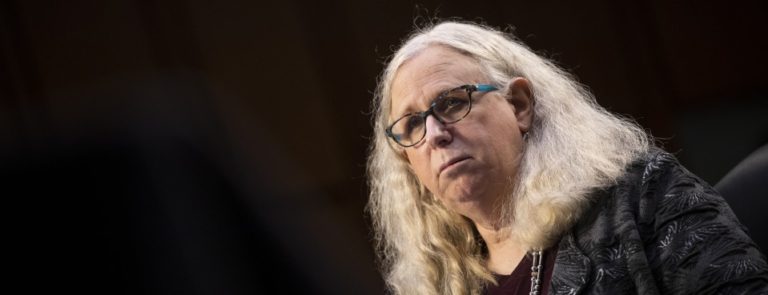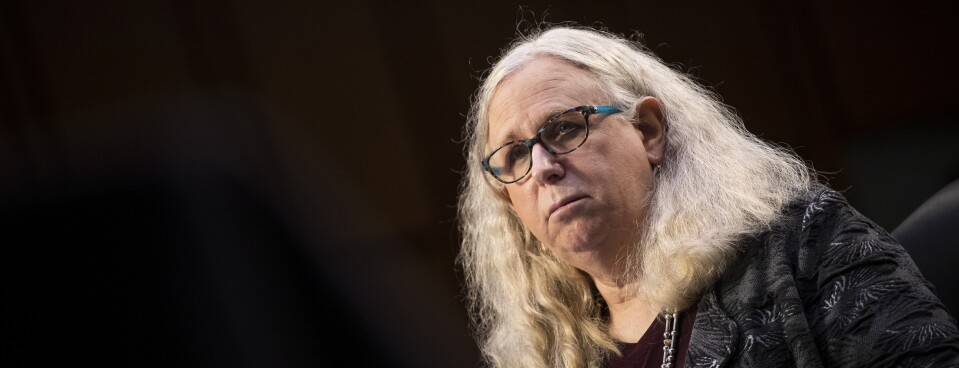

Rachel Levine has a full plate of health inequities she wants to tackle as the Biden administration’s assistant secretary for health, including Covid-19 vaccinations, LGBT health care, HIV, opioid use, and environmental impacts on health.
Because of her position as the highest ranking openly transgender official in any administration, she is facing pressure to be a voice for her community and make a real impact on health policy in the next few years.
The role of assistant secretary for health at the Health and Human Services Department is often shaped by its holder, with the authority to address a multitude of public health issues and a limited amount of time to do so.
Levine’s goals all come back to one message that President
In an interview with Bloomberg Law, Levine said she’s already accomplished one goal: reversing the Trump administration’s interpretation of the Affordable Care Act’s nondiscrimination protections. The Biden administration said May 10 that it would include sexual orientation and gender identity as part of Section 1557 protections.
That interpretation is critical to allowing states to expand their coverage for LGBT Americans, she said. When Levine was a state official in Pennsylvania, she used Section 1557 to expand Medicaid and the Children’s Health Insurance Program to cover gender-affirming treatment, and she worked with the state insurance department to do the same with commercial insurance companies.
She now has the national platform to work with other states to do the same thing, but she also has to make sure this reinterpretation is carried out successfully.
“Just saying it doesn’t mean it’s done, and doesn’t mean it’s going to be implemented successfully,” Levine said. She said her main concern is in states that are passing laws to prohibit gender-affirming care for transgender youths and ban transgender women from competing in women’s sports.
“We have regressive laws which are not consistent with that interpretation,” which creates additional work for the federal government, she said.
Covid-19, Ending HIV
Levine said her “No. 1 priority still has to be Covid-19” and making sure there is equitable distribution and administration of vaccines.
However, Covid-19 has provided a “generational opportunity” to build up the public health workforce, Levine said, which could aid some other goals, like ending HIV.
Biden announced a plan May 13 to invest $7.4 billion in recruiting and hiring public health workers across the country.
Covid-19 and HIV/AIDS have “shown us the critical importance of public health in this country,” and efforts to add more public health workers will help address other public health threats, she said.
Levine saw HIV in its early years starting in 1983 during her training as a pediatrician at Mount Sinai Hospital in New York City.
“I tragically saw babies who had had vertically transmitted HIV die. We saw their mothers die. Sometimes their fathers died,” Levine said. “Then we saw teenagers from either horizontally transmitted HIV or we saw actually a lot of the teens who had hemophilia, who had gotten HIV from their factor eight.”
Vertically transmitted HIV is when children get HIV from their mother; horizontal transmission typically happens through sex or needle sharing. Factor eight is a protein that helps blood to clot. Thousands of hemophiliacs received contaminated blood until the mid-1980s.
At the time Levine was practicing in New York, the idea of finding a safe and effective medication to prevent HIV would have been a “miracle.”
However, a program to get 200,000 uninsured patients free access to the HIV prevention drug Truvada hasn’t seen much success. As of Feb. 28, the program had just 1,827 participants, according to Harold Phillips, chief operating officer of the Ending the HIV Epidemic Initiative.
Levine said she is “absolutely committed to addressing and we are committed to ending the HIV epidemic,” continuing work started by the Trump administration.
“We need to strengthen our relationships across the board with community-based organizations, with networks of people with HIV, with clinicians and researchers, with state and local health departments and governors” to get the message out so “people know about this program and take advantage of this program,” she said.
“We can’t take our foot off the gas on this,” Levine said.
Tackling the Opioid Crisis
Levine said her entire career has focused on the intersection between physical health and mental and behavioral health.
She wants to bring her experience working on the opioid crisis in Pennsylvania to the country and make much-needed improvements.
More than 87,000 people died from drug overdoses in the 12 months ending in September 2020, the most of any year on record, according to provisional data from the Centers for Disease Control and Prevention. Many of the overdoses were related to powerful synthetic opioids.
She said her three areas of focus will be to prevent addiction by making sure the prescription of opioids is “judicious and careful,” increase distribution of the overdose-reversal medication naloxone, and put greater emphasis on medication-assisted treatment.
While physician general of Pennsylvania, Levine wrote an order to allow anyone to get naloxone and amended it during Covid-19 to include mail-order prescriptions. “We gave it out free at our state health centers, we worked with the local health departments to give it out free, we worked with stakeholders such as hospitals and other places to give it out free,” she said.
“I will certainly be working with state health officials to do that for states that don’t have standing orders,” Levine said. She also plans to discuss with advocates and her team other policy actions that could make it even easier to distribute naloxone.
Environmental Justice
Climate change is not often thought of “in terms of health equity, but we believe strongly in the concept” of environmental justice, Levine said of the Biden administration.
A Biden executive order in January directed a number of actions from the HHS, including the creation of an office around climate change and health equity. That office will reside within the Office of the Assistant Secretary for Health, Levine said.
“Tribal communities, communities of color, poor individuals, other vulnerable individuals have really borne the brunt of environmental stress and [are] bearing the brunt in terms of climate change,” Levine said.